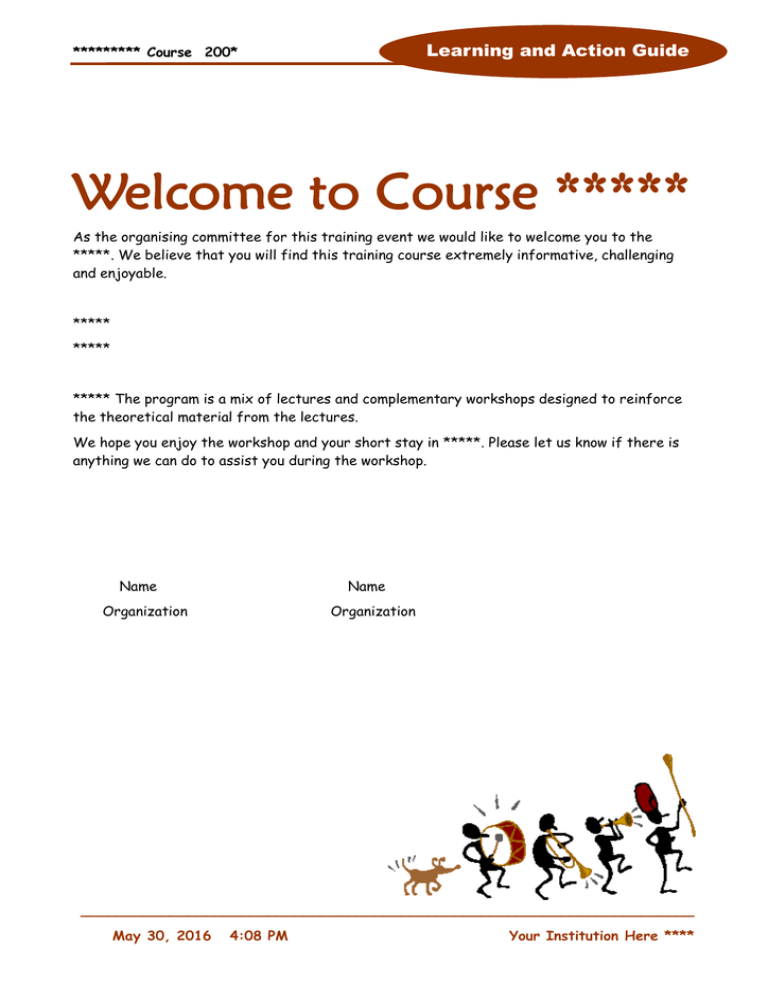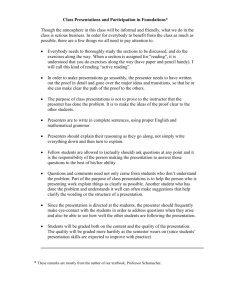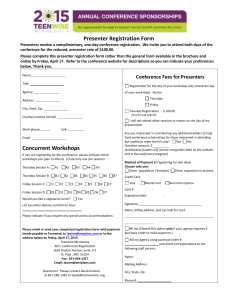Welcome to Course ***** Learning and Action Guide
advertisement

Learning and Action Guide ********* Course 200* Welcome to Course ***** As the organising committee for this training event we would like to welcome you to the *****. We believe that you will find this training course extremely informative, challenging and enjoyable. ***** ***** ***** The program is a mix of lectures and complementary workshops designed to reinforce the theoretical material from the lectures. We hope you enjoy the workshop and your short stay in *****. Please let us know if there is anything we can do to assist you during the workshop. Name Name Organization Organization _____________________________________________________________________ May 30, 2016 4:08 PM Your Institution Here **** Learning and Action Guide ********* Course 200* Why are you here? Have you ever been on a course and Made notes you never looked at again? Had good ideas but didn’t implement them? Spent your time only with people you know? Returned to work but didn’t change what you do or how you do it? If you answered yes to any of these, then this Learning and Action Guide is for you. Goals Your attendance at this workshop has involved the commitment of significant resources (time, effort and money) by yourself, your organisation and the workshop organisers. Obviously we all think that this is a worthwhile investment. You will gain most from this course if you first focus on what you hope to gain from your attendance and participation. Work What do you want to achieve that will change the way you and your colleagues work or what you do? Personal How can you be more effective during this course and on your return? This Workshop Handbook belongs to: Name Address …………………………..…………………………..…………………………..………………………….. …………………………..…………………………..…………………………..………………………….. …………………………..…………………………..…………………………..………………………….. _____________________________________________________________________ May 30, 2016 4:08 PM Your Institution Here **** ********* Course 200* Learning and Action Guide Getting the Most from Course ***** An exciting program has been designed for this Workshop. There is a host of world-class presenters and well-designed workshops. Although we have had fun developing this course, it is not for us but for you. It is your course and what you get out of it will largely depend on what you put into it. We urge you to make it the best course you have ever attended. You can do this by: setting goals for what you want out of the course and actively seeking to meet them keeping presenters focused on what is important to you although, of course, if you are the only one interested in that aspect, see them after the session listening to others and allow them the time and space to express themselves thinking of ways you can contribute which will benefit others talking to other participants and lecturers about their experiences and concerns (the personal contacts you make will be very useful after you return home) focusing on ideas that you can use to improve your work. Continuing your learning after the course and sharing your knowledge and information with others in your Meteorological Service. ***** We are aware that, for many of you, English is not your native language. If you do not understand something, please do not hesitate to ask us to repeat it or to explain it differently. Using this Learning and Action Guide We have endeavoured to bring together all the pertinent information for this course. This Guide has been developed to help you to focus on learning outcomes for each session but, more importantly, to focus on ideas that you can apply after the course and ways in which you can turn them into action. Use this Guide as your key record and as a way of generating these ideas and actions. _____________________________________________________________________ May 30, 2016 4:08 PM Your Institution Here **** ********* Course 200* Learning and Action Guide Getting the most from Presentations Different types of presenters Presenters will vary enormously in their styles. Some you will find riveting, others may appear dull (to you - but not, perhaps, to others); some will present overviews, others details; some will be interactive, others didactic; some content will be very pertinent to you, others won’t seem directly relevant. However, almost all presentations will offer something for you to learn from or be inspired by. Content If the subject matter is very relevant to you, you will want to learn as much as possible. This doesn’t mean trying to write everything down. In fact, if you try to do that you will miss out on a lot that could make a difference to you. Detailed content will be available in the handouts. That’s a far more efficient way of accessing it. (If there is insufficient information there, talk to the presenter after the session and ask for a copy of the paper. Don’t be hesitant. The presenter will be flattered that someone is interested in their work and ideas. Make their day!) Normally the details of the content won’t be important. What is important is what ideas the session triggers for you and what you do with them. All the detail in the world won’t matter if you don’t apply it. If the content is not directly relevant to you (it won’t always be) don’t worry. Although the facts or applications may not be relevant, you may be able to learn something from the approach. Can you apply the technique to problems in your area? Is there something about the approach that is novel or different to what you do? Presentation style Everybody presents differently and everybody learns in their own style. Sometimes these will match up (for you), sometimes they won’t (although it may suit others). Your role Remember that these presentations are for you, not for the presenter. It’s your course. Your job is to: ask questions if you are getting lost or think something has not been clearly expressed keep the presenter focused not go overtime with questions but follow-up in the break if necessary stay active and look for ideas you can apply in your work. _____________________________________________________________________ May 30, 2016 4:08 PM Your Institution Here **** ********* Course 200* Learning and Action Guide Taking Notes Most presenters have either provided a hard-copy of their talk or an electronic version that is available on the Workshop CD-ROM or Web site. Don’t try to write down all of the content (you already have access to it) but focus on ideas that you can adopt or adapt. Using the Session Notes Section For each presentation we have provided a page for you to take notes. The presenter has provided their goals for their session. Use the preformatted sections to make a note of any references you may wish to follow up, any interesting quotes (these often encapsulate the main points of a talk or remind you of the speaker and the session), any ideas that have been sparked by the presentation and how you can turn them into action, including what follow-up work you need to do. Concept Mapping Concept mapping (or “mind mapping”) can be a handy way to capture the essence of a talk. Don’t feel constrained to any one approach. Do what works for you and vary it to suit the content. _____________________________________________________________________ May 30, 2016 4:08 PM Your Institution Here **** ********* Course 200* Learning and Action Guide Getting the most from Workshops Goals The workshops are designed to develop or enhance your skills. Some will be more relevant to you or your work than others. To get the most out of the workshops you will need to clearly identify what your goals are and how you will be able to apply what you are learning. Your role Remember that these workshops are for you, not for the presenter. It’s your course. Your job is to: Focus on your goals and work towards meeting them Be active—don’t just wait for learning to “happen” Don’t wait for your partner to do the work or rely on them if you also need the skills If you are unsure what to do it is your responsibility to ask Stay active and look for ideas you can apply in your work. Help each other Enjoy yourself! Getting the most from Resources You have been provided with many resources that may help you in your work or that would be useful to other people. These include CD-ROMs, on-line links, notes, technical reports, etc. They will be of no use if they are not used. You will be provided with proformas for each main resource. Please use them to make a brief note of the content, what should be done with it, who should know about it or be given it and any ideas that it inspires, as well as how you will follow-up with action. _____________________________________________________________________ May 30, 2016 4:08 PM Your Institution Here **** ********* Course 200* Learning and Action Guide This Guide will last forever ... _____________________________________________________________________ May 30, 2016 4:08 PM Your Institution Here **** ********* Course 200* Learning and Action Guide Housekeeping Location Refreshments Morning and afternoon tea and coffee will be provided on this floor. Please keep the area tidy. There are many restaurants and food halls in the vicinity ***** Communications Messages can be received on **phone number***. Use of computers ***** ***** Security ***** If there is an emergency you will need to exit via the stairs. Follow instructions. Administrative support The Administrative Support staff will assist you in any way they can. They are ***** and are located at ***** ***** ***** _____________________________________________________________________ May 30, 2016 4:08 PM Your Institution Here ****


